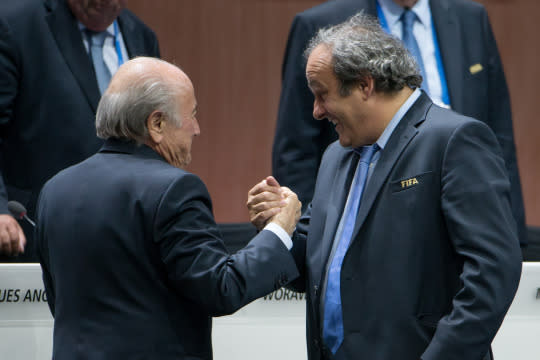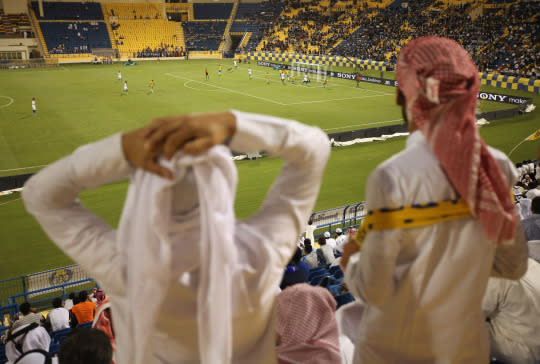Is FIFA finally facing up to a moment of truth?
At last…A few decades late, perhaps - but better late than never - FIFA is finally facing up to a moment of truth. What happens next?

World football’s governing body has reached a point of no return, its executive committee deeply tainted by the corruption scandals that have engulfed it since Qatar was named as the host nation for the 2022 World Cup finals, along with Russia for 2018, and its’ most senior figures suspended or banished to the wilderness.
And just when it seems it must be all over bar the shouting and the overhaul, it continues to worsen with Thailand’s Morawi Makudi banned, along with Sepp Blatter and Michel Platini, from all football-related activities for 90 days while FIFA’s ethics committee sets in motion an investigation into his potential wrongdoings.
These, it is understood, include requesting a bribe to support England’s bid to host the 2018 World Cup finals.
He was named by former Football Association chairman Lord Triesman, in 2011, along with Brazilian Ricardo Teixeira, Jack Warner of Trinidad and Paraguayan Nicolas Leoz.
The latter threesome have all been indicted as part of the US Department of Justice’s ongoing investigation into FIFA’s web of corruption.
The FIFA investigators have a lot of work ahead, but it is worthwhile and will be widely appreciated around the world as, nearly six months on from the dramatic May morning when nine FIFA officials and five other associates were the subject of dawn raids on their hotel rooms in Zurich, and the subsequent announcements made by the US Attorney General Loretta Lynch, football fans hope for an end to this spiral of greed, intrigue and routine corruption.
Makudi was a member of the now notorious executive that stunned the world with its vote in Zurich in 2010 and, though the most recent, he is almost certainly not likely to be the last to be investigated after following what appears to be a long and dishonourable tradition within and around the organisation that dates back to a dark and murky past even before Blatter took up his place as president, in succession to Joao Havelange, in 1998.
Now 99, the Brazilian is widely regarded as the man who created this modern money-orientated model of FIFA, in all senses, the Godfather of it all. He oversaw the doubling in size of the World Cup finals and with it the growth in revenues and web of deals, political and financial, that were to create this dynasty.
Indeed, according to Swiss court documents released in 2011, Havelange, who became president in 1974, and his stepson Teixeira - a former FIFA official and former president of the Brazilian football federation - received around $42 million in bribes between 1992 and 2000 from the International Sport and Leisure (ISL) marketing company in exchange for FIFA broadcasting rights. Havelange’s involvement, it was noted, began in 1982.
But this appalling story of avarice and deception, which centred then on the activities of Swiss sports marketing company ISL, is just a part of a wider tragedy that began under Havelange’s presidency. It also involved Horst Dassler, the heir to the Adidas sportswear empire, who was in charge of ISL at the time.
TV rights grew in value and were sold via ISL for burgeoning profits that were paid back into the FIFA coffers. The money ended up, it is said, being used to buy the votes that kept Havelange and his cronies in power.
So, nothing much bar the names has changed since then, you might say. The original business model, if it can be called that, carried on working from the 1980s until more recent times.

Which is what brings us back to Blatter, the survivor of so many close shaves in a career punctuated by claims of wrongdoing, and Platini, the president of UEFA, a man who was so graceful on a football pitch that his athletic purity continued to defy those who suspected his integrity as a sports politician, and still does, until most recent events.
These are men of charm and easy-paced authority who handle their own public relations, in up close and personal situations, with conviction. In my first meeting with Blatter, who was FIFA’s secretary general at the time, the football official went out of his way to provide comforts and hospitality. He understood the value of a good relationship with a reporter from one of the world’s leading news agencies.
In our second meeting, he smiled and said it was “so nice to see my friend Robert Redford again”, a wink accompanying the handshake in a disarming display of oily friendship. In spite of a series of pre-planned questions, it was difficult to make him squirm or lose his grip of the situation. By then, he was president and he had moulded FIFA even more to his own liking and persuasion.
Platini had the same warm smile and big handshake. In one of only a few meetings with me, he made much of his poor English, cracked jokes about the cultural divide of the English Channel and the unique passion of English football.
At the time, he was sitting in a large winged armchair in a cool and air-conditioned lobby of a vast hotel in Doha, at that time the less than well-known capital of Qatar.
Around him, football people, referred to so often as ‘the movers and shakers of the game’, were being softened up to make the right moves at an Extraordinary Congress.
It was clear money was not in short supply. It rarely was in the days when agents and other associates of football’s body of officialdom were gathered at the corporate trough.
It was not so clear that deals that might associate Qatar with a future World Cup finals tournament could be completed there and then. Easy to see now, with hindsight, of course.
That meeting took place in October 2003, when the Congress ended early, Blatter’s place in power unchallenged, his charm and political nous having ensured his continuing control of the federation. It may have grown more difficult as the years passed, by the same skills, accompanied by accusations of bribery and much controversy, served him again and again – as he clung on in office.
Now 79, he has been banned for 90 days. There is no proper explanation of why he paid Platini £1.35 million in 2011 for services rendered, he said, nine years previously.
What else, one can wonder, may have been agreed in Doha where FIFA celebrated the unanimous support given to Blatter’s declaration of his own mandate for the future with a dinner attended by 1,100 guests? It was the first such gathering of FIFA officials – attended by 80 employees – in the Middle East. And subsequently, years later, of course, Platini voted for Qatar as the host nation for the 2022 finals.

The investigators are at work. The heroes – those reporters who worked for the BBC and for The Sunday Times and the rest of the British and international media who broke story after story about FIFA’s corruption and decadence – are due their rewards, too.
With both FIFA and UEFA operating without a true and trusted man at the top, the time has now come, surely, for change and a radical new structure and sense of direction. Yet Blatter has appealed, claimed he is innocent and declared he was not permitted due process – a situation that may allow for him to return to work before the presidential election, to find his replacement, is held next February.
And Platini is following suit, outraged at his treatment and, more bizarrely, retaining support from organisations like the English Football Association, who declared long in advance that they backed him, as the UEFA man, to succeed Blatter in Zurich.
This week, UEFA plans to hold (on Thursday October 15) an emergency meeting at its Nyon headquarters, overlooking Lake Leman, to consider finding an alternative to Platini in the FIFA elections.
In the opinion of many, it is time to turn the page and find a new man for not just FIFA, but UEFA too, with a need for rules and statutes to be revised so that an outsider of impeccable integrity can be brought in to reform the tarnished modern version of what once was known, in Pele’s words, as “the beautiful game.”
And it is not too late.

 Yahoo Sport
Yahoo Sport 





































